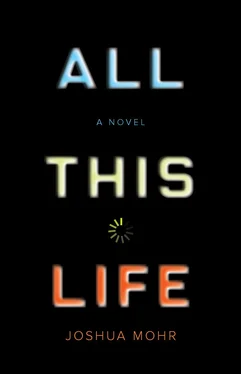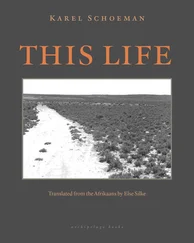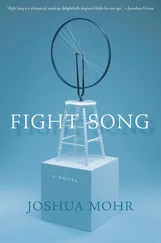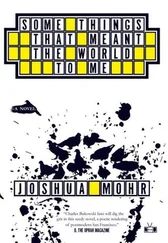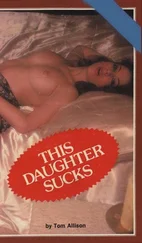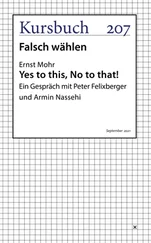Joshua Mohr
All This Life
Can you feel my heartbeat?
— NICK CAVE
The thing you need to realize about my equation E=mc despairedis that no one has ever thought about psychology and thermodynamics and existentialism as they relate to mathematics before. Not even you, Albert, though I know technically you were a physicist, and I’m saying all this with the utmost respect to you and your work. For without you as my predecessor, I wouldn’t have been able to take your research to the next level. I never would have developed existential mathematics, which is really what my century needs. See, you were a product of your time, as we all are. Your E=mc 2brought us to nuclear fusion, which is the greatest and most treacherous advancement of your century. Back then, the world was only concerned with science and science and science. Modernity. Technology. Urbanization. And now my generation is paying the price for all that. You should see us now, aspiring to be computers. Machines are man’s best friend. You led us down a lonely road, one you wouldn’t have been able to foresee, but trust me, it’s bad here. It’s burning. We are all about to burn. And the question is: Why are we burning? Why is the earth heating up? Maybe it’s all the fossil fuels, the greenhouse gases. Cow farts are killing us. The methane. None of those are my areas of expertise, and I’m not invalidating those things as contributing forces. What I’m saying is those aren’t the ONLY factors. There’s one gigantic cause that no one talks about, and it’s the foundation of my equation, my E=mc despaired: Human sadness is what’s heating up the earth. We are so somber, Albert, our lives are squared by despair and thus we all emit such a sad heat that our planet will torch unless we get it under control. Everything adds up. Pretty soon bodies will turn to ash and scribble the sky and mix with other people’s ashes and mix with other people’s and still mix with others, but what if there is a solution, a way to put off our doomsday, a way to repair our sadness? Wouldn’t that be a lovely fate? So I thought of you, thought that if you were to come back, we could work together. As equals. As colleagues. As heroes. I am conjuring you, Albert. This communication proves our minds are connected. I’ve been training for this. I am focused on bringing you back, sending this signal out to find you. I’ve liberated all my neurotransmitters from any societal incarcerations, and I can safely say that I am the only one on the planet capable of seeing this thing through. We need you more than ever. We need your expertise. Otherwise, I fear the worst. I am dedicated to our cause and need only a signal from you, a sign that will alert me to our work. I am blessed with fortitude. Lots of people have convictions yet most lack the resilience to face consequences. I will risk everything, Albert. I will bleed to keep this world uncremated.
PART 1. INSIDE THE SEARCH ENGINE
It’s another brittle day, all of them inching over the Golden Gate Bridge into San Francisco, their typical trek to cluttered desks, schlepping with their hangovers, their NPR, carpools and pod-casts, prescription pills and nicotine patches, their high-def depressions, Lasik so they can see all their designer disaffections, lipstick smeared on bleached teeth, bags under their eyes or Botox time machines, bald spots or slick dye jobs, bellies wedged in pants or carved Pilates bodies, their urges to call in sick, their woulda coulda shouldas.
More rationalizations and regrets running through the air than cell signals.
No one wants to get to work. Even those claiming to enjoy their jobs still bristle at the idea of oozing into ergonomic chairs, reviving computer screens, feeling the day’s flickering chaos erupt on their faces.
A couple extra hours of sleep. A half-day. Telecommuting. Something other than the full slog. The particulars of their jobs don’t even matter because all the variables lead to one delicate plea: Please give us a day off. A day to ourselves. A day to feel free. To be alive.
But this is a morning without such clemency and so there they sit, in their Hybrids and leased sports cars and family sedans, eeking a couple toes on the accelerator before hitting the brake again.
Bumper to bumper.
A Bluetooth chain gang.
The weather is perfect. No wind. No fog. Well, there is fog hanging out over the Pacific, but it hasn’t pushed in yet. The sun’s out, shining off the bridge’s bright orange paint.
The posted speed limit is 45, which is a brutal joke at this time of day.
It should say 4 or 5 .
Someone needs to fix that conjunction-less sign.
Not only does the speed limit tease, so does the traffic zooming out of San Francisco, motoring next to them, by them, zipping along right at the 45-miles-per-hour clip. That drew some sighs from our commuters, pining for U-turns and quick getaways and sordid adventures.
The bridge is one level, laid out in such a way that the traffic lanes are flanked by walkways teeming with tourists snapping selfies, joggers in fluorescent kicks, bicyclists in outfits that look like sausage casings. Buses dump out their international passengers so they can run out to the middle of the bridge, ooh ing and aah ing at Alcatraz and Angel Island, the 360˚ view, the ocean gleaming on one side, the Marin headlands looking lush from the north, San Francisco sparkling, immaculate, vibrant.
It’s always hectic here on the bridge, always full, always rushing, even in traffic. Because these days you don’t just work at work. Technology, that noose. Everyone is reachable all the time . Including traffic jams. Devices bring emails and conference calls and video chats in an uninterruptable river.
A peek in the window of some cars shows mouths screaming into headsets, forlorn expressions on faces as to-do lists multiply, workdays grow into evenings into all-nighters, weeks into weekends. Life its own traffic jam.
A white Prius houses a father and his fourteen-year-old son. They keep away from each other in the morning. Or Jake keeps away from his dad, his surly chauffeur. Jake knows the sad hierarchy: A Google search of his father’s favorite things would not return the boy as a page one result. Jake has never understood what makes him so moody as they drive in together, and yet there’s really no way his father could explain it. No way for the father to unpack adult disappointment. It’s impossible for the father to convey that he’d expected his life to amount to more than some middling stake in a PR firm, and it’s too late to fix.
How can he tell his only child that commuting is a kind of daily desolation, his mind always flapping to the past even when it’s the last thing he wants to remember? Being young: when he released his potential and passions and possibilities up into the air, freeing them like doves, his whole life ahead to watch all his dreams come true. How can he tell his son that becoming an adult is learning to live with your failures, learning to dodge these dying birds as they thump back to earth?
How do you say that to your boy?
You don’t. You commute. You make your boss happy. You collect those paychecks and keep your eyes peeled for dead doves.
The father turns the volume up on an AM sports talk show, the next caller saying, “I’d like to discuss how our quarterback is an effin’ moron,” and the father settles into another unfulfilling distraction.
Jake, never trying to disrupt their frail truce, spends his time filming things out the window with his iPhone. Stealing frames from people’s lives. Poaching and posting them online, his pieces of property. Yesterday, he captured a woman flossing her teeth while steering with her elbows, the day before a guy with little scissors trimming his moustache like a bonsai tree.
Читать дальше
